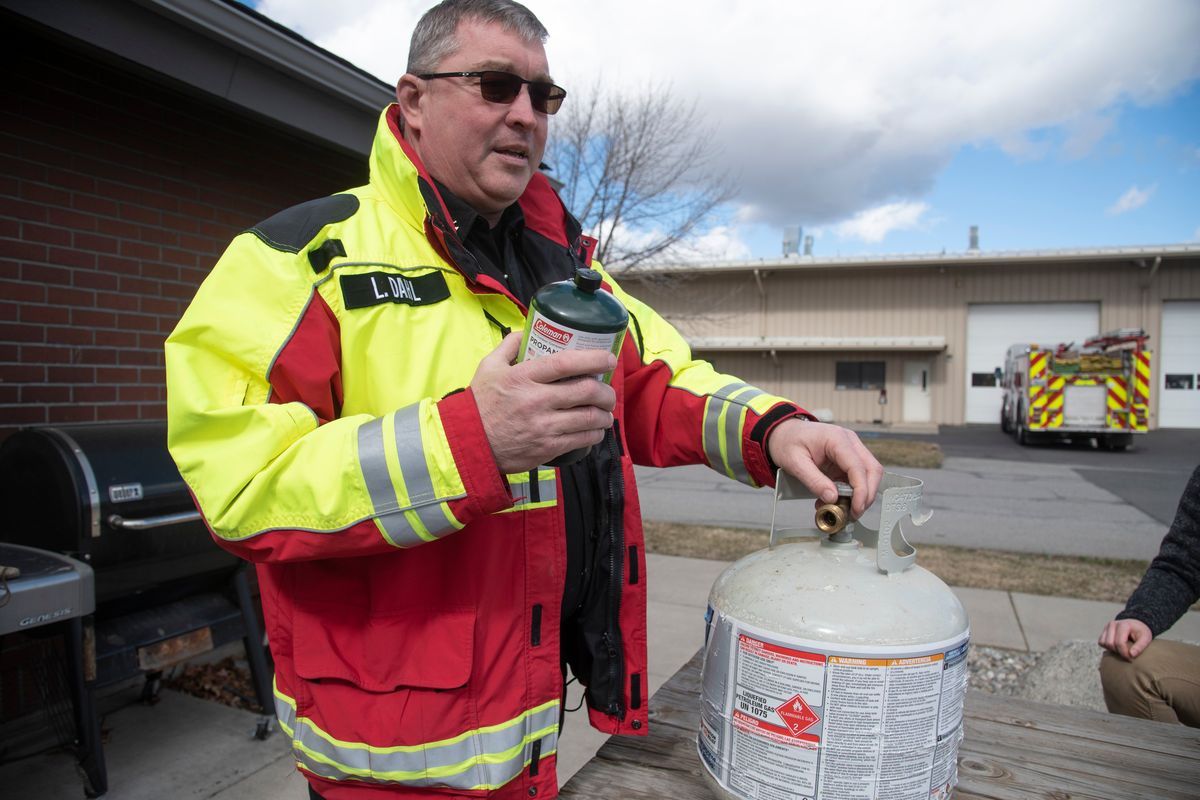With grilling season around the corner, fire marshal says use propane safely

As the snow melts and backyard grills emerge from their dusty covers, it’s important to check propane tanks and connections for safe cooking, said Fire Marshal Lance Dahl.
The Spokane Fire Department responds to about 250 cooking-related fires a year, Dahl said. Recently, there also has been a cluster of tent fires and explosions due to propane used to heat the tents.
One fire in January at an encampment near the Spokane River sent two people to the hospital with serious burns. On March 9, another propane tank being used to heat tents exploded at a homeless camp near Second Avenue and Thor Street. No one was injured.
Most propane-related fires are caused by a connection issue, Dahl said. Most people don’t check their connection for leaks when hooking up propane to their grill, Dahl said.
If the leak is large enough, gas can accumulate in the area, then when there’s a spark from the grill, a hot engine or any other flame source nearby, the gas will burn off. If the leak is large enough, the fire could continue at the leak source, Dahl said.
That’s often when the fire department is called in to put out the fire, he said.
The easiest way to check for leaks is to spray soapy water on the connection area; if there are bubbles, the connection isn’t secure, Dahl said.
It’s important to make sure your propane tank is requalified within 12 years, Dahl said. The person refilling your tank should make sure it’s not damaged, corroded, dented or beyond qualifying requirements before refilling your tank, Dahl added.
Older tanks used to not have an over-pressurization valve, but newer tanks – those with a triangular top – do, and it will relieve any buildup of pressure in the tank.
If a tank were to get heated without the valve to relieve that additional pressure, it can cause what’s caused a boiling liquid expanding gas explosion, or BLEGE, Dahl said.
Storing tanks away from the house in a covered area like a garden shed can prevent an explosion in the event of a house fire, Dahl said. The distance can also help residents from breathing in the gas if there were to be a leak.
The cause of some of the recent tent fires at area homeless camps has been not only unsafe heating practices but transfer filling, said Fire Chief Brian Schaeffer.
Transfer filling is when a small portable canister of propane is refilled at home from a larger tank, Dahl explained.
It’s dangerous for a number of reasons. With numerous connection points, it’s easier to have leaks. In a large propane tank, the liquid gas is mainly at the bottom of the canister, which can be hard to reach when transfer filling, meaning the smaller tank is only partially filled and largely filled with gas rather than liquid, Dahl said.
People can also easily overfill the small bottle, and with only a tiny valve to let off extra pressure, an explosion is more likely, Dahl said. The small portable bottles, often used for camp stoves, are designed for one-time use, making reuse unsafe, Dahl said.
“It’s just really not a safe practice,” Dahl said. “You’re filling these up, you’re not checking your connections.”
At a camp site, refills can often take place near a campfire, which is just another layer of danger, Dahl said.
While there is no really safe way to heat a tent, Schaeffer said, it’s important to reduce harm as much as possible.